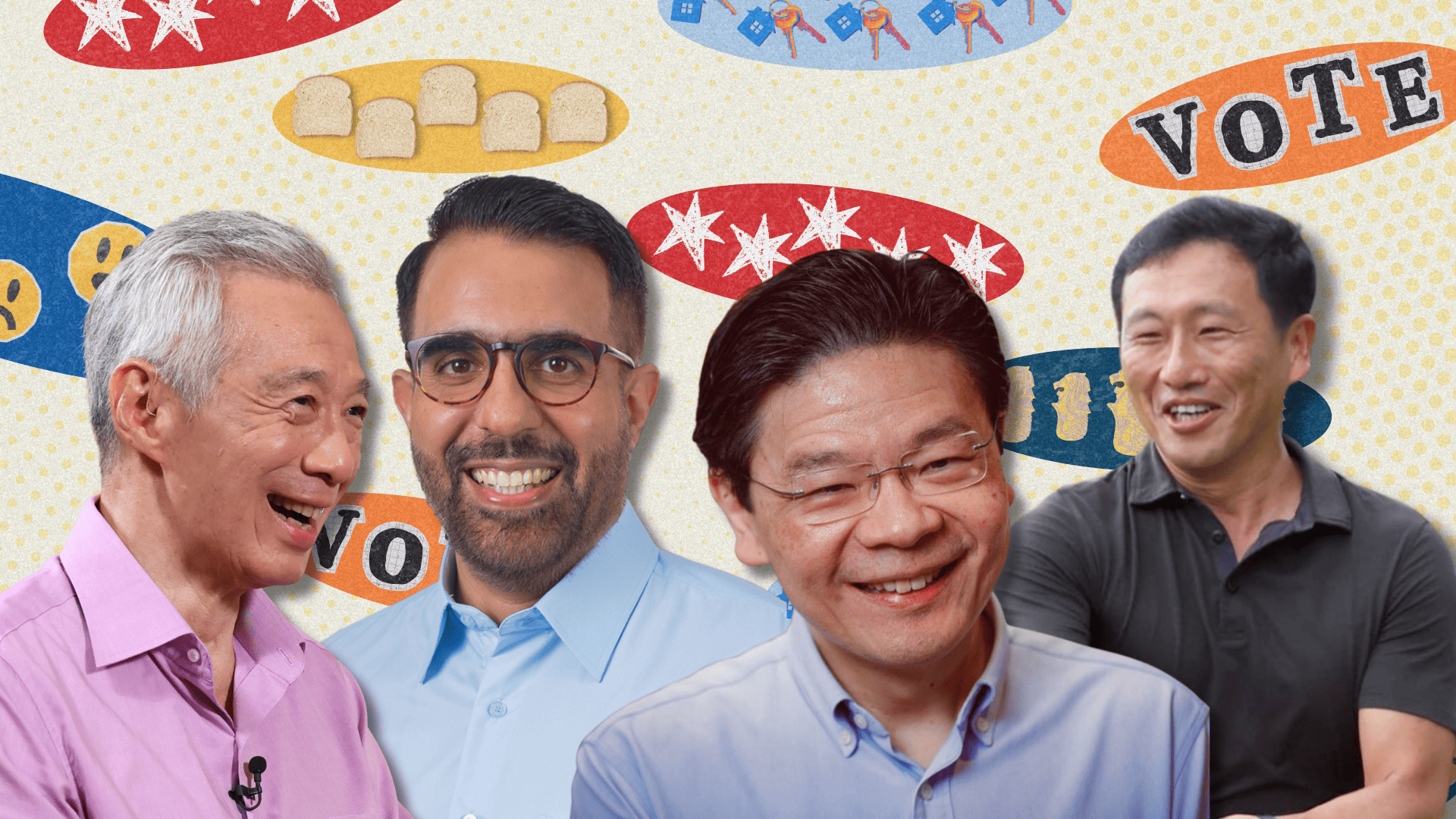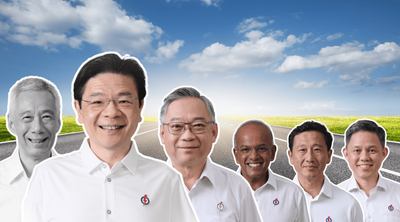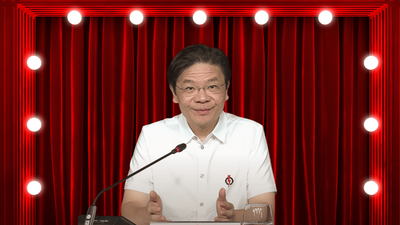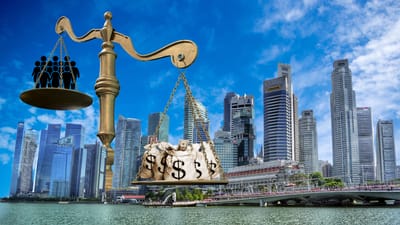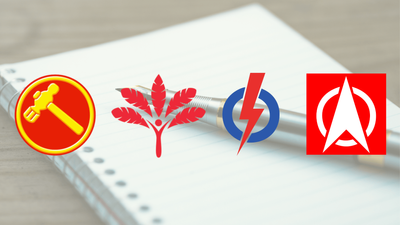Lee Hsien Loong, Lawrence Wong, Pritam Singh, and Ong Ye Kung are the Singaporean politicians who should be happiest with the results from Jom’s first voter sentiment survey. The senior minister, prime minister, leader of the opposition, and minister for health, respectively, are universally liked across age and racial groups.
And, surprisingly, across the political spectrum too: the three from the ruling People’s Action Party (PAP) are still fairly popular with respondents who identify as opposition leaning and “neutral”; and, conversely, the Workers’ Party (WP) chief is relatively well-liked by PAP supporters and neutrals.
This is one of the key findings from our survey of 1,000 citizens aged 21 and over, which we commissioned Milieu to conduct in June this year. Our full methodology note is at the end. As promised last week, in the first of this two-parter, we’ve today also shared the raw data (and weighted data) that Milieu sent us. Play with it; tell us what we’ve missed.
When asked if they approved or disapproved of how Lee Hsien Loong handled his job as prime minister, a resounding 74.9 percent of respondents either strongly approved or somewhat approved. Generally speaking, a 70 percent approval is considered an extremely strong showing for any country’s leader. Lee is well above most who’ve been recently assessed.
Lawrence Wong isn’t far behind. Since the handover from Lee to Wong occurred just a month before our survey, we phrased the question slightly differently—asking respondents about their confidence in Wong’s ability to handle his job as prime minister. In other words, Lee’s was more of a backward-looking assessment; Wong’s more a prediction. Some 70.6 percent said they’re either very confident or somewhat confident in Wong’s ability. There is, however, a difference in the proportion of so-called super fans: those who “strongly approve” of Lee (26.2 percent) and those who are “very confident” of Wong (14.6 percent).
Nevertheless, Wong should be pleased. One of the enduring questions he’s faced, and will continue to face, is whether he (and his other “4G” colleagues) will be able to match the performance and popularity of their predecessors. Here’s one data point to support him. We’ll observe how it shifts in our next survey.
In terms of particular segments, older respondents (55 and above), Indians, and (unsurprisingly) PAP fans expressed relatively stronger feelings for Lee and Wong.
We asked respondents to rate politicians in terms of their likeability, with 1 being “Not at all likeable”, 5 being “Neutral”, and 10 being “Extremely likeable”. (Our methodology note explains how we chose these 14 to rank.) In line with their impressive performance in terms of approval and confidence, respectively, Lee Hsien Loong (7.1) and Lawrence Wong (6.7) are well ahead of the rest, with Lee the only politician with an average score above 7.
Lee, the oldest son of Lee Kuan Yew and Kwa Geok Choo, entered politics in 1984, and is one of the country’s most recognisable faces. He regularly wins elections with one of the highest margins, so perhaps this is unsurprising. Wong, by contrast, is a relative newcomer, having entered politics in 2011, and wasn’t even the party’s first choice as prime minister. Unlike his predecessors, he did not attend a brand name school, junior college, or undergraduate programme. His ascent up the civil service and then political ladder has, by all accounts, surprised those around him.
The next general election, due by November 2025, will be his first as prime minister. Ahead of that, results from our survey should be a filip—it appears like Singaporeans are taking to the dark horse, the unlikely prime minister.
Ong Ye Kung and Pritam Singh (both 5.9) are also popular. Social media sensation Ong’s likeability might be contrasted with that of Chan Chun Sing (5.4), the other prior contender for the top job, and Gan Kim Yong (5.6), deputy prime minister. For Singh, it’s worth considering how much more popular he is compared with Leong Mun Wai (4.7) and Hazel Poa (4.6) of the Progress Singapore Party (PSP), but also the likes of Louis Ng (4.9) and Josephine Teo (4.6) of the PAP. Those last four Singaporean politicians have the distinction of being the only ones to score below 5 overall.
More broadly, Singh should take some comfort in his likeability, given that he’s had various accusations hanging over him from soon after he entered Parliament in 2011: the town council brouhaha, the Raeesah Khan lying incident, and now, at this very moment, a trial over allegations that he himself lied to a Committee of Privileges in the aforementioned investigation.
One could argue, in fact, that Singh is the latest in a long line of opposition leaders—including Lim Chin Siong (Barisan Sosialis), JB Jeyaretnam (Workers’ Party), and Chee Soon Juan (Singapore Democratic Party)—to have been effectively pummelled in public by the establishment for various alleged wrongdoings. What impact has all that had on Singh’s popularity and likeability? Observing the swagger with which he’s been photographed approaching the Singaporean courts, and the findings from this survey, he’s possibly winning in the sympathy stakes. The PAP, not for the first time, runs the risk of coming across as a bully.
It’s important to preface this discussion by asserting that we don’t necessarily agree with the ways in which the colonial-era Chinese-Malay-Indian-Others (CMIO) classification is deployed in Singaporean society. Still, it is what we must work with for now. Lee Hsien Loong and Lawrence Wong maintain their popularity across racial groups. Ong Ye Kung’s likeability rises well above Pritam Singh’s in the eyes of Chinese, which perhaps speaks to his personal proficiency in the language and his family’s roots. His father, Ong Lian Teng, was a Chinese community leader in rural Singapore before joining Barisan Sosialis. (In 1966, having resigned his parliamentary seat, he held a banner outside Parliament, whose Chinese characters proclaimed the death of democracy.)
By contrast, Singh is more popular among respondents from the Malay, Indian, and Others groups.
The top of this chart simply confirms the popularity of Lee Hsien Loong and Lawrence Wong. (The former, indeed, with a stonking 8.34 likeability score among the PAP’s supporters.)
More interesting, arguably, is the bottom, where Pritam Singh (5.66) is more likeable than Louis Ng (5.25) and just a shade behind Josephine Teo (5.79) and Maliki Osman (5.72). Why are PAP fans not that enamoured by these PAP politicians?
It’s not entirely clear why Maliki scores so low, though it could be partly because he’s just not that well known. Meanwhile, Ng’s focus on lesser-known causes, like animal rights to busking sites, perhaps can make him seem less attuned to the more prosaic concerns of Singaporeans. Put another way, he could be unpopular because he focuses on unpopular things. (“All Singaporeans Matter. This is Why MP Louis Ng Champions Unpopular Causes”, was the title of a Rice Media profile.)
The low score of “JoTeo”, by contrast, will validate many Singaporeans’ suspicions. She is known for her public gaffes and apparent lack of empathy. In 2016, in response to the difficulty Singaporeans have in getting on the housing ladder, and their attendant inclination to delay having kids, she said, “You need a very small space to have sex.”
In 2020, in response to the abject conditions migrant workers contended with during the pandemic—all the more galling given the top-notch care afforded citizens—Teo, then minister for manpower, was asked in Parliament whether she’d consider issuing an apology to them. Her tone deaf answer ended with: “I have not come across one single migrant worker himself that has demanded an apology.”
Teo is currently the minister for digital development and information, and is by far the lowest-ranking full minister on our different likeability lists. Insiders suggest she’s favoured by Wong. Whatever her administrative merits, this survey indicates that she could be an electoral liability. If a stronger opposition challenge comes her way—in the last election, she faced a limp team led by Lim Tean—the PAP could risk losing a minister.
One notable thing here, in comparison with PAP supporters, is that opposition supporters are just generally far less enthused by their politicians. Only three politicians even score above 5. The two WP representatives, Pritam Singh (6.84) and Sylvia Lim (5.61), should be happy, as should Lee Hsien Loong (5.17). The fact that Lee scores well even amongst the opposition base could be a symptom of his long tenure and Singapore’s relatively recent political liberalisation—many who identify as opposition fans might have till quite recently been PAP (and Lee) followers.
The PSP’s two representatives, Leong Mun Wai (4.7) and Hazel Poa (3.76), may come away with mixed feelings—they’ve risen up this likeability chart, for sure, but may not be happy that they’re still pipped by some PAP heavyweights.
Finally, coming dangerously close to JoTeo (2.76) at the bottom of the list is K Shanmugam (3.29), the powerful law and home affairs minister. Among other reasons why opposition fans may not take to him, “Shan” is the architect of several notorious laws, including the Protection from Online Falsehoods and Manipulation Act (POFMA) and the Foreign Interference (Countermeasures) Act (FICA). Last year’s revelations about the palatial colonial bungalow he rents (fairly) from the government also probably dented his likeability amongst Singaporeans, many of whom, as last week’s results showed, are struggling to just get by.
Voters who identify as “neutral” exhibit similar likeability scores as the overall respondent base. One notable difference is that, as with opposition supporters, Josephine Teo is right at the bottom.
This dot plot shows the gap in likeability between PAP fans and opposition ones. One takeaway is that, in terms of the PAP’s politicians, all the “tough” guys are further up, while the relatively more moderate, geeky wonks are further down. K Shanmugam, Lee Hsien Loong, and Ong Ye Kung are perhaps the kind of personalities you want batting for your team; but are a bit of a pain to have on the other side. That could explain the relatively bigger divergence between PAP fans and opposition ones vis-a-vis their respective likeabilities.
Interestingly, the PSP’s Hazel Poa and Leong Mun Wai have higher likeability scores among PAP fans than with opposition ones. It’s unclear exactly why, though we can postulate. First, the PSP, founded by Tan Cheng Bock, a former PAP MP, is in many ways the closest thing Singapore has to a PAP splinter group. Much of their base is composed of former PAP fans. So perhaps there are respondents who lean towards the ruling party, but are also sympathetic to the PSP.
Separately, given that the WP is by far the strongest opposition party, it’s conceivable that some respondents who identify as opposition leaning are really just WP leaning. Singapore’s opposition is not monolithic, and indeed, prior attempts at collaboration have shown that there’s little love lost between them. This could explain why some ostensible opposition fans do not view the PSP politicians favourably.
The main takeaway here is that PAP politicians are most popular with the youngest (21-24) and oldest (55 and above) segments. With the former, it could be that they’ve just emerged from years of public school indoctrination about the glories of the great party. They also have yet to really face the rigours of working life in one of the world’s costliest cities. Indeed, the PAP politicians’ likeability drops dramatically from the 21-24 segment to the 25-34 segment. The older segment, meanwhile, perhaps likes PAP politicians more partly because it’s the party they’ve grown up with, and the one under whom their lives have changed.
By contrast, Pritam Singh’s likeability is fairly consistent across age groups.
Almost all of our survey questions are perennial, in that we might repeat them in future iterations. But we asked one that’s more attuned to current affairs. For context, last year four politicians—three sitting members of Parliament and one rising star—were forced to resign from their parties because of personal indiscretions. In the wake of those scandals, there was some measure of doubt about how puritanical Singaporeans are—not simply in terms of sexual morality but also our perception of the line between personal affairs and high office.
The survey findings, alas, might be construed in different ways. A conservative might be thrilled that almost 80 percent of respondents feel a politician’s personal life (e.g. extramarital affairs) affects their suitability for office. A liberal, meanwhile, could reasonably argue that only less than a third believe it “affects greatly”. Put another way, over 70 percent of respondents may not have strongly objected if the philandering politicians were still in Parliament.
Jom doesn’t intend to ask this question again next year, but hey, you never know.
Methodology note:
Our team was eager to craft a survey that could capture how Singaporeans felt about a range of important political and socio-economic issues. We assessed similar surveys overseas, including those conducted by Gallup and Pew, before deciding on the final list of questions, in consultation with Milieu.
This is what led to our combination of barometer questions, which will over time indicate how sentiment is shifting in Singapore; questions about issues of concern, in which we also provided an open-ended answer box, so as not to nudge respondents towards our own biases; questions about voting behaviour (aforementioned all in last week’s article); leadership approval and politician likeability questions; and a one-off, topical question assessing what Singaporeans think of politicians’ extramarital affairs.
When it conducted its fieldwork, surveying Singapore citizens 21 and above, Milieu set hard quotas for age, gender and race while setting soft quotas—which are more flexible and serve as guidelines—for income and education. These quotas are meant to approximate each segment’s representation in broader society.
After completing its fieldwork, Milieu weighted the data: a statistical technique used in market research to adjust the contribution of different segments of the sample to ensure that the overall composition accurately reflects the target population’s characteristics. In the majority of cases, including this one, weighting the data does not significantly change results.
You can access both the raw and weighted data here.
Finally, how did we choose which politicians to compare? Space and time limitations meant that we could include only 14. We first used the SG Parliament tracker to identify the top 10 ranked by number of speeches in Parliament from Nov 2006 - May 2024. We removed Khaw Boon Wan from the list as he’s retired. We then added Lee Hsien Loong (former prime minister), Pritam Singh (leader of the opposition), Leong Mun Wai and Hazel Poa (for PSP representation), and Maliki Osman (for Malay representation). It took us a while to formulate our approach, and we welcome all suggestions on how to improve it in next year’s edition.
Jom’s expanded voter sentiment survey team included the following contributors: Pradeep Krishnan, Loh Pei Ying, and Robin Vochelet. We’re grateful for their help over many months.
Letters in response to this analysis can be sent to sudhir@jom.media. All will be considered for publication on our “Letters to the editor” page.
If you enjoy Jom’s work, do get a paid subscription today to support independent journalism in Singapore.


